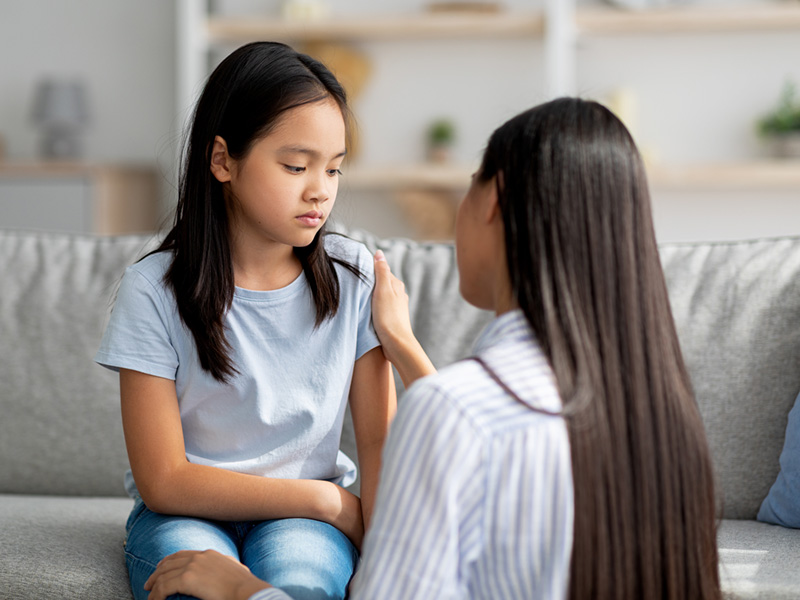Unfortunately, school shootings are no longer as surprising as they once were, but they are still unexpected and shocking, and bring up a lot of thoughts and feelings. Today (two days after the shooting in Uvalde, Texas) adults are struggling with sadness, worry and heartbreak. In addition, parents are challenged with how to guide and comfort their children who may have heard about the shooting. Parents may feel ambivalent about talking to their children directly, and yet the truth is that if parents don’t talk to children and help them with their reactions, others will provide information that may not be useful.
Here are tips for talking with your children about school shootings:
- Pause and think through the big messages you want to send your children about school shootings. Talk over ahead of time (with friends or partners or family) the words you want to use. Be sure you are feeling calm and don’t convey big emotions that might concern children.
- You might want to find out what your child already knows, if they have heard about what happened.
- Tell them that you and everyone else has had thoughts and feelings about the shooting and tell them what feelings you are struggling with (e.g., “I felt sad most of the day,” or “I wish shootings didn’t happen in our country”). You might then describe how you coped with your feelings (“I decided to call my friend and talk it over for a while.” Or “I decided to go for a long walk in the park just to feel fresh air on my face”). Role-model talking about emotions and self-care. Send messages about sharing feelings and don’t discourage whatever feelings come up.
- Reassure children that there is no “one way” to feel. We all have lots of different feelings and they are all okay to have. One important message is that they can talk about or show their feelings to people they trust. Make sure they know that you are there at any time for any questions they may have. Weekly family meetings might be helpful if time permits. Kids have so many worries right now and it’s important they know what to do with them. Families can hold difficult emotions together rather than letting any one person suffer in isolation.
- This is not the time to talk politics. Simply state that sometimes people make bad choices and maybe can’t think straight. Even though we hear about school shootings when they happen, most schools are very safe, and teachers and school guards are working hard to keep everyone safe. Be sure you reassure children that people care and are trying to solve problems so that shootings don’t occur. Remind children that their schools might already have emergency plans in place. Ask them to tell you what they’ve learned so far about staying safe in a crisis situation.
- Don’t be afraid to say “I don’t know,” because in this case, it is absolutely true. We don’t know what causes people to make these kinds of choices.
- Answer the questions with honesty and at the developmental level of the child.
- Spend some time talking about self-care. You might even make a cheat sheet with them of who their resources are in the school, what to do if they notice something scary and to be sure their school has emergency plans in place. If they don’t, you may need to advocate for that.
- Monitor TV time right now. It’s better for kids not to see explicit pictures of dead bodies, or parents crying about losing their children.
- Whenever possible, talk about how the police helped, how the fire department came quickly, how communities come together, how people honor the victims, how much support goes to the families during this tragedy.
The country is in collective grief, and hopefully this despair will bring some positive change and preparation for safety in the future. All of us need to take care of ourselves and each other, in our families, in our communities, in our religious institutions, in nature or wherever you feel there is hope and optimism for a better world. Finally, as we are all very aware, children are experiencing anxiety, depression and despair from the challenges of living with COVID, witnessing a war on our screens and noticing parental despair from the stressors that abound. If your child cannot be comforted, if their worries cause them to stop doing normal activities, if they can’t sleep, if they are isolating out of fear, please seek consultation from a mental health professional.
It’s important to hold your children close to you right now. Be patient. They may need repeated reassurance, they may need extra hugs or extra time. In addition, if your children have had direct experiences that are traumatic, please be super sensitive to the fact that they may get triggered to remember those events by being exposed to this one. Even if the type of trauma is different, the feelings of fear, anxiety, confusion, etc., might be the same, and those feelings will serve as a bridge to other such experiences. Children who are previously traumatized may have stronger reactions and need extra help for longer periods of time.
Related
10 Ways to Help Your Kids When the World Feels Scary
Tips on Talking to Children About Their Worries and Concerns

